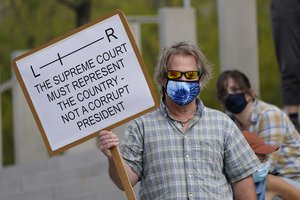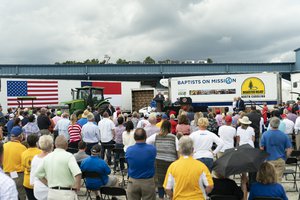
William Penn
William Penn (24 October 1644 (O.S. 14 October 1644) – 30 July 1718) was an English real estate entrepreneur, philosopher, early Quaker and founder of the Province of Pennsylvania, the English North American colony and the future Commonwealth of Pennsylvania. He was an early advocate of democracy and religious freedom, notable for his good relations and successful treaties with the Lenape Native Americans. Under his direction, the city of Philadelphia was planned and developed.
In 1681, King Charles II handed over a large piece of his American land holdings to William Penn to satisfy a debt the king owed to Penn's father. This land included present-day Pennsylvania and Delaware. Penn immediately set sail and took his first step on American soil in New Castle in 1682. On this occasion, the colonists pledged allegiance to Penn as their new proprietor, and the first general assembly was held in the colony. Afterwards, Penn journeyed up river and founded Philadelphia. However, Penn's Quaker government was not viewed favourably by the Dutch, Swedish, and English settlers in what is now Delaware. They had no 'historical' allegiance to Pennsylvania, so they almost immediately began petitioning for their own assembly. In 1704 they achieved their goal when the three southernmost counties of Pennsylvania were permitted to split off and become the new semi-autonomous colony of Lower Delaware. As the most prominent, prosperous and influential "city" in the new colony, New Castle became the capital.

Jeremiah Evarts
Jeremiah F. Evarts (February 3, 1781 – May 10, 1831), also known by the pen name William Penn, was a Christian missionary, reformer, and activist for the rights of American Indians in the United States, and a leading opponent of the Indian removal policy of the United States government.
Early years
Evarts was born in Sunderland, Vermont, son of James Evarts, and graduated from Yale College in 1802. He was admitted to the bar in 1806. Evarts married Mehitabel Sherman, a daughter of United States Declaration of Independence signer Roger Sherman, and a member of the extended Baldwin, Hoar & Sherman family that had a great influence on U.S. public affairs. Jeremiah and Mehitabel Sherman Evarts were the parents of William M. Evarts, who later became a United States Secretary of State, US Attorney General and a US Senator from New York.
Battle against Indian removal
Evarts was influenced by the effects of the Second Great Awakening and served the American Board of Commissioners for Foreign Missions as its treasurer from 1812-1820 and Secretary from 1821 until his death in 1831.

General Cigar Company
General Cigar Company is one of the largest manufacturers of cigars in the world. It has been owned by Swedish Match since 2005.
Company history
In 1961 General Cigar, which was profitably selling about $30 million worth of cigars annually, was purchased for approximately $25 million by a group of investors headed by Edgar M. Cullman, a fourth generation American in the tobacco industry.
Later in the 1960s, Culbro and General Cigar acquired Gradiaz Annis, maker of Gold Label cigars and the Temple Hall factory that owned the Macanudo brand name, ushering in a turn towards hand-rolled premium cigars. Macanudo, a small label made in limited quantities for the market in the United Kingdom, was seen as the principal vehicle for growth in the premium cigar category. A careful effort was made to reblend the product for the large American marketplace (then and now subject to a ban on Cuban tobacco, the industry's gold standard) using select binder and filler from the Dominican Republic, Jamaica, and Mexico and Connecticut shade-grown wrapper. Mass advertising was conducted in support of the brand, which by the early 1990s had grown into the best selling premium cigar label in the United States.
William Penn (athlete)
William Penn (March 15, 1883 – July 2, 1943) was an American tug of war competitor who competed in the 1920 Summer Olympics.
In 1920 he finished fourth with the American team in the Olympic tug of war contest.
External links

William Penn (Calder)
William Penn is a bronze statue by Alexander Milne Calder of William Penn.
It is located at the Philadelphia City Hall, Penn Square, Broad Street and Market Streets, top of clock tower, Philadelphia, Pennsylvania. It was installed 1894; it was cast in fourteen sections, and took almost two years to finish.
Gallery

1894 - ready for lift up
1894 - ready for lift up

Alexander Milne Calder, with the head of his statue of William Penn
Alexander Milne Calder, with the head of his statue of William Penn

Left side
Left side
References
External links
William Penn (cricketer)
William Penn (born 29 August 1849, The Cedars, Lee, Lewisham, London - died: 15 August 1921, Belgravia, Westminster, London) was an English cricketer who played for Kent in the 1870s.
Penn was born in Lee, Lewisham, the son of John Penn, a manufacturer of marine engines at the John Penn and Sons works in Deptford and Greenwich, and educated at Harrow (1865-1867).
Cricket
A right-handed batsman and bowler, he was the eldest of three brothers who also played for Kent; the other two were Frank and Dick Penn. He played for Kent 18 times from 1870 to 1878, also appearing for Marylebone Cricket Club (1874) and Gentlemen of the South (1871-1874). His son Eric Penn played for Cambridge University and MCC.
Business career
William Penn became a member of the Institution of Mechanical Engineers in 1873, proposed by his father and Joseph Whitworth. He became a partner in the family business around the same time, began to manage the firm in 1875, and in 1889, when the firm was incorporated as John Penn and Sons Ltd, he and his elder brother John were the two principal shareholders. When the company amalgamated with the Thames Ironworks and Shipbuilding Company ten years later, William Penn became a director of the new company, but resigned from the board by April 1901 on grounds of ill health.
'William Penn' is featured as a movie character in the following productions:
Penn of Pennsylvania (1942)
Actors: Joss Ambler (actor), Dennis Arundell (actor), Frank Atkinson (actor), Gordon Begg (actor), Charles Carson (actor), O.B. Clarence (actor), Escott Davies (actor), Arthur Dent (actor), Clifford Evans (actor), David Farrar (actor), Arthur Goullet (actor), Henry Hallett (actor), Arthur Hambling (actor), Laurence Hanray (actor), Max Adrian (actor),
Genres: Drama,Listen Lester (1924)
Actors: Alec B. Francis (actor), Lee Moran (actor), Harry Myers (actor), George O'Hara (actor), Dot Farley (actress), Louise Fazenda (actress), Eva Novak (actress), Harry Linsley Cort (writer), Lewis Milestone (writer), Harold Orlog (writer), William A. Seiter (writer), G.E. Stoddard (writer), William A. Seiter (director), Owen Marks (editor),
Genres: Comedy,Penn, William Filmography
-
1953, role: actor , character name: Inductee
Penn, William Filmography
-
1985, role: composer
Matching books:
Famous quotes by William Penn:

William Penn
William Penn (24 October 1644 (O.S. 14 October 1644) – 30 July 1718) was an English real estate entrepreneur, philosopher, early Quaker and founder of the Province of Pennsylvania, the English North American colony and the future Commonwealth of Pennsylvania. He was an early advocate of democracy and religious freedom, notable for his good relations and successful treaties with the Lenape Native Americans. Under his direction, the city of Philadelphia was planned and developed.
In 1681, King Charles II handed over a large piece of his American land holdings to William Penn to satisfy a debt the king owed to Penn's father. This land included present-day Pennsylvania and Delaware. Penn immediately set sail and took his first step on American soil in New Castle in 1682. On this occasion, the colonists pledged allegiance to Penn as their new proprietor, and the first general assembly was held in the colony. Afterwards, Penn journeyed up river and founded Philadelphia. However, Penn's Quaker government was not viewed favourably by the Dutch, Swedish, and English settlers in what is now Delaware. They had no 'historical' allegiance to Pennsylvania, so they almost immediately began petitioning for their own assembly. In 1704 they achieved their goal when the three southernmost counties of Pennsylvania were permitted to split off and become the new semi-autonomous colony of Lower Delaware. As the most prominent, prosperous and influential "city" in the new colony, New Castle became the capital.
Latest News for: william penn
Penn, Patricia
 Omaha World-Herald
27 Sep 2020
Omaha World-Herald
27 Sep 2020
Eastern area real estate transactions for the week of Sept. 27
Football - Charles begins junior season
 Advertiser-Gleam
26 Sep 2020
Advertiser-Gleam
26 Sep 2020
Clipboard
 The Scranton Times-Tribune
26 Sep 2020
The Scranton Times-Tribune
26 Sep 2020
CUTILLO: Introducing news Sports Editor Lambos
 Finger Lakes Times
26 Sep 2020
Finger Lakes Times
26 Sep 2020
Penn Hills Council votes to take proposals from potential tenants for William McKinley Community Center
MIdland bowling starts season Saturday
 Fremont Tribune
25 Sep 2020
Fremont Tribune
25 Sep 2020
William Hill approached by Apollo, Caesars about takeovers
 Henry Herald
25 Sep 2020
Henry Herald
25 Sep 2020
Security agents spot gun at Pittsburgh International checkpoint
Best fall foliage season in years is possible, says Pennsylvania expert
Echoes of a life: Poet Jack Lynch debuts 'Ashe County Poems'
 Watauga Democrat
25 Sep 2020
Watauga Democrat
25 Sep 2020
‘Open letter to America’ signed by 489 national-security leaders calls Trump ‘not equal to the enormous responsibilities of his office’
- 1
- 2
- Next page »
Article Search
Most Viewed
Democratic Underground | 27 Sep 2020
South China Morning Post | 27 Sep 2020
The Observer | 27 Sep 2020
Raw Story | 26 Sep 2020
The Daily Telegraph Australia | 27 Sep 2020
The Independent | 27 Sep 2020
The Oregonian | 27 Sep 2020





































